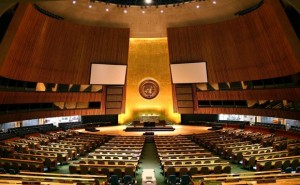This week, world leaders head to the “Parliament of Nations” as captioned by Paul Kennedy in his book “The parliament of Nations: the past, present and future of the United Nations”. The 69th session of the United Nations is with us and the most critical agenda item seems to be the post-2015 development question. With almost a year to the December 2015 deadline set by the UN in 2000, we have come to realize that; first, the MDGS have served a very significant milestone for development over the past decade and second, that there is still time needed for “toddling” countries to catch up with the development pace. The 2014 MDGs report reaffirms that the MDGs have made a profound difference in people’s lives[1] and the EndPoverty2015 Millennium Campaign calls the MDGS the most successful global anti-poverty push in history[2]
So what do Model UN delegates expect world leaders to do during this UN Session? We expect them to set good examples for us to model. In his book, “Interventions: a time in War and Peace” former Secretary-General Kofi Annan, contends that the MDGs should not be re-negotiated because there was the chance of destroying its momentum and progress. Instead, he advised that the new challenges facing the achievement of the MDGs should be looked at. Among these, Mr. Annan noted the rise in organized crime, the problem of climate change and the global economic downturn. Looking at these three, the global economic problem seems to have subsided, climate change still hangs in the balance and organised crime and terrorism seems to be surging.
It is very evident that many Model UN conferences have themed around climate change. In fact, Model UN has been used as a key process to setting the climate change agenda in the run-up to this year’s UN Summit. One of such evidence of the role of Model UN in the real UN is the FerMUN 2014[3] organized by Ferney Lycée International in Geneva. Apparently the resolutions from these youth delegates was so substantive that, the ITU Secretary-General Dr Hamadoun I. Touré, pledged to transmit the outcome texts of FerMUN14 to UN Secretary-General Ban Ki-moon at the forthcoming UN Climate Summit taking place in New York on 23 September 2014[4]. As I write this article, the UN Climate summit is ongoing and the Secretary-General Ban Ki-moon has already come clear on what is expected; “that there is no “Plan B” for action as there is no “Planet B.” Hopefully, the Model UNs that have been held across the world in the past year have pointed to this stance. What remains is the business and political will by the world leaders converging in New-York to “not let their young fellows down”. If you took our high school Model UN students to vote in the stead of their real diplomats today, unfettered climate action will begin immediately. Why? Because as young as they are, high school students understand and appreciate that truly, climate change is affecting people’s livelihood and making it difficult for them to rise out of poverty.
Peace and Security are indispensable vehicles for business to thrive and development to take place. The rise in the terrorist organisations need the immediate and amplified attention of the international community, especially the Security Council and the first committee of the General Assembly responsible for disarmament and international security matters. I am sure that many model UN crisis simulations have given attention to the terrorist groups like al-Qaeda, al-Shabaab, Boko Haram and the al-Qaeda in the Islamic Maghreb. Emerging snares like ISIL/ISIS are yet to be tackled. The Security Council now has to be decisive and united in the action against such terrorist groups as the terrorists themselves have shied away from openly displaying division in their ranks. Model UN crisis directors need to be following closely the proceedings of the Security Council on these new threats in order to be able to develop effective simulations for delegates. The new dynamics of the drugs and arms trade are also a matter worthy of note by the 69th sessions of the United Nations.
But for the recent outbreak of Ebola across the West-African sub-region, it would have been assumed that UN discussions on health are a “usual” feature subsumed in other socio-economic issues. But the 69th session needs to look at the Ebola crisis on its own merit and from all dimensions. There is the security dimension, the economic dimension and the social dimension. The world is watching how world leaders will unite for action on these issues.
In conclusion, the UN and the goals for development are still relevant today as they were in September 2000. What is needed is not to re-negotiate the deal, but to work on the bottle-necks (climate change, epidemics and insecurity) that have made their achievement still a mirage for most developing nations. The Model UN fraternity needs to and will be watching closely the events that unfold at this 69th session because the outcome will be a strong determinant and motivation of what Model UN’s around the world will be talking about in the ensuing academic year.
[1] http://www.undp.org/content/undp/en/home/librarypage/mdg/the-millennium-development-goals-report-2014/
[2] http://www.endpoverty2015.org/en/2014/07/07/the-millennium-development-goals-report-2014/
[3] http://fermun.org
[4] http://www.itu.int/net/pressoffice/press_releases/2014/CM01.aspx#.VCGRSxIfn-h



